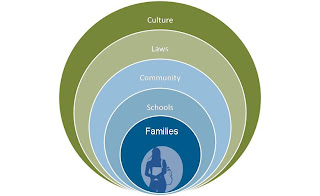



That's the Super Bowl, you know. The Marin Institute has once again launched a campaign encouraging kids to submit anti-alcohol ads in opposition to the tsunami of beer and alcohol advertising that happen during the Super Bowl. The contest is called "Free the Bowl."
In this year's contest Big Alcohol is personified as "Big Al:"
Marin Institute has launched its second annual, nationwide anti-alcohol-advertising contest, FREE the BOWL™. This year's theme is to "Free the Bowl from Big Al," (a.k.a Big Alcohol), as youth contestants will identify where they see the negative influences of Big Al in their lives.
The contest for youth and young adults from ages 10 to 25 seeks original anti-alcohol-ads 30 to 60 seconds long to counter excessive alcohol advertising and marketing. The alcohol industry watchdog launched the contest at www.FreeTheBowl.com today and will use the site as well as YouTube to showcase video entries. The contest deadline is January 25, 2010, two weeks before the Super Bowl, the biggest alcohol advertising and inebriation day of the year. This year groups may compete, such as high school or college classes.
Are you thinking of making a Free the Bowl ad? Check out last year's winners.
While face to face conversation is most teens’ choice for this kind of communication, parents might be missing a big opportunity if they don’t embrace new technology.
Parents who are waiting for the "right time" to talk with their kids about drugs and alcohol may be missing everyday opportunities to connect on this important issue, said Steve Pasierb, president and CEO of the Partnership. "While nothing can take the place of an in-person conversation between parents and teens, for some parents, emails, cell phone conversations, and even texting can help start a conversation with a reluctant teen and reinforce talks you've already had--plus, parents can reach teens at times when use tends to be likelier--after school, on weekends and during unsupervised time."
The survey underscores that "Generation Text" has arrived -- when asked which was more important for everyday communication with friends, texting or social networking; teens were far more likely to communicate directly by texting (63 percent) than to rely on websites like Facebook (38 percent) to stay connected. And teens don't only want to hear from their friends. A majority of teens -- 67 percent -- were open to receiving texts from their parents after school -- a time when teens are most likely to be unsupervised. For many parents, texting may be an additional tool for monitoring and staying in touch with teens.
For parents who are nervous about using technology, Partnership for a Drug Free America publishes a free how-to text guide (.pdf) and a list of 7 Ways to Connect With Your Teen Using Technology. There are several TXT MSG translations available online.

The Marin Institute is offering prizes (including a MacBook and iPods) for youth age 13-20 who create ads for their Free the Bowl contest:
"Year after year, Anheuser-Busch and the National Football League hide behind weak, ineffectual Beer Institute self-regulatory guidelines to justify exposing youth to exploitive alcohol ads," said Michael Scippa, advocacy director at the Marin Institute. "Big Alcohol turns a deaf ear to our protests, so we want them to listen to compelling messages from young people who resent being targeted as new customers."
Anheuser-Busch is expected to spend up to $19 million on ads during the 2009 Super Bowl.
Deadline for contest entries is Jan. 25. The winner will be announced on Super Bowl Sunday, Feb. 1. Ads created for the contest will be posted to YouTube. For more details, see www.freethebowl.com.(via Join Together)
According to the Marin Institute, 30 million youth viewed advertising during the 2008 Superbowl--more ads for beer than anything else. Research shows that the more alcohol advertising teens see the more likely they are to drink, and drink to excess. This contest will give beer companies the message that this exploitation of youth must stop.
When asked what parents could do to prevent them from drinking and other risky behavior, teens said parents could limit their child's participation in overnight parties, wait up for a teen to return from a date or party and call parents of the party's host in advance to make sure it will be well-supervised. Oddly enough, teens also said parents could help by establishing rules and consequences for breaking them, coupled with punishment, if needed.
